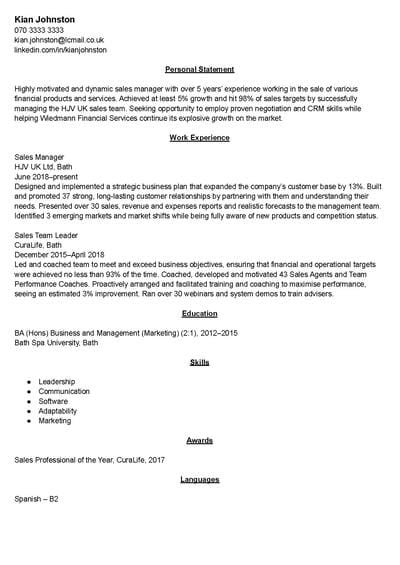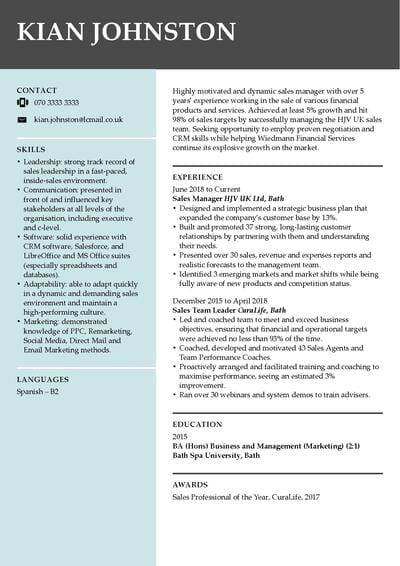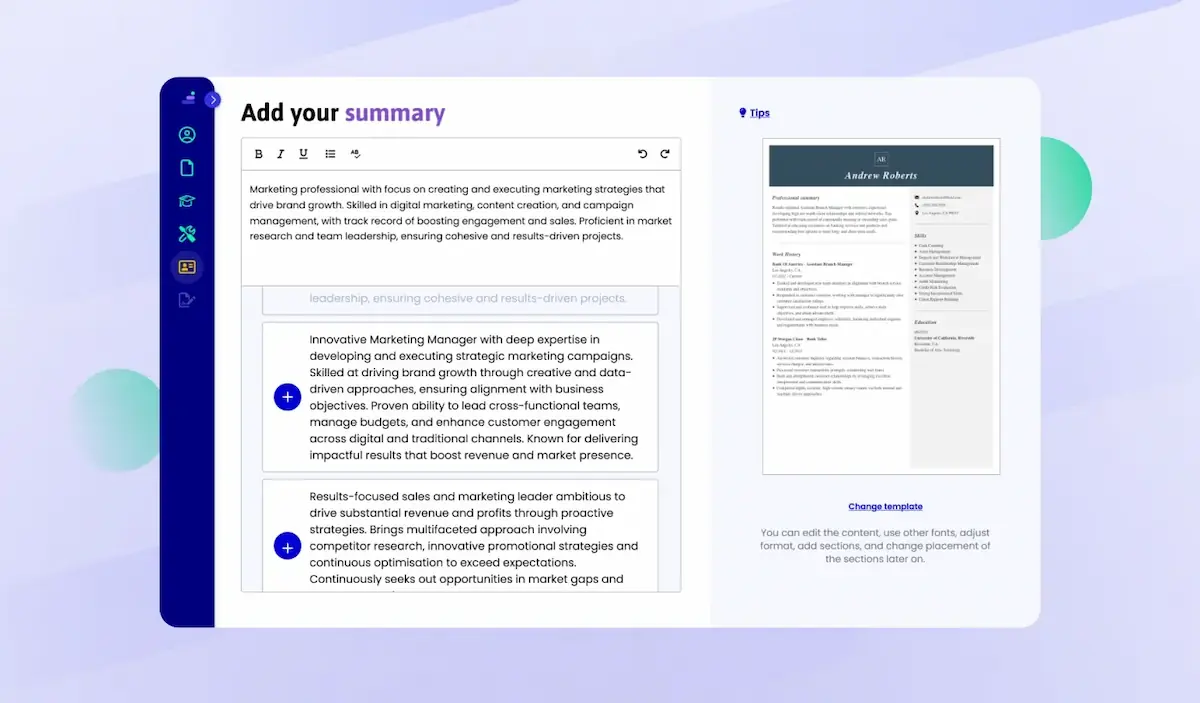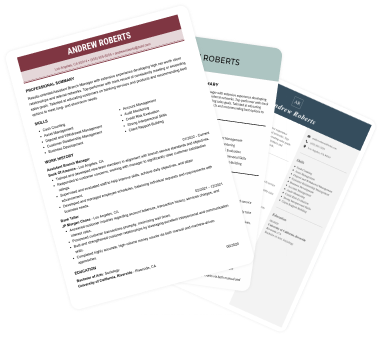Create a professional CV now!
 NO
NO YES
YESLast updated on 29 January, 2026

Our customers have been hired by*:
AI is no longer a thing of the future; it’s already influencing how businesses run, customers engage with brands, and the ways employees get things done. Whether it’s catching fraud behind the scenes or powering online chatbots, AI is now a regular part of day-to-day operations in just about every industry.
But as helpful as it is, it’s also changing the job market in significant ways. While some jobs are simply becoming more efficient with AI, others are at risk of disappearing altogether. In this article, I’ll explore what jobs AI will replace and what that means for the future of work.
Create an effective CV in minutes. Choose a professional CV template and fill in every section of your CV in a flash using ready-made content and expert tips.
Create a professional CV now!
 NO
NO YES
YESWe created the sample on the left using our builder. See other good CV examples like this one.
Want to read more articles on AI CVs? Check these out:
Why AI can replace it:
Data entry involves transferring information from one format to another, which is an ideal task for AI. Machine learning and optical character recognition (OCR) systems can now extract data from physical documents, emails, or web forms with high accuracy and minimal supervision.
How it’s changing:
Companies are implementing automated data pipelines that reduce or eliminate the need for manual input. This not only lowers labour costs but also minimises errors that could occur due to tiredness or oversight. Some data tasks still need a human eye, but most traditional data entry jobs are quickly disappearing.
Impact in numbers:
The changes might affect 95,100 data entry specialists in London.
Career shift advice:
If you're currently in data entry, consider turning towards roles in data analysis or data management. Strengthen your skills in tools like Excel, SQL, or Python for data manipulation and analysis. These fields are expanding as businesses require skilled professionals to derive insights from large datasets and implement AI-driven solutions.
See how to write a data analyst CV.
Why AI can replace it:
Cold calling for sales usually follows a script, which makes it easy for AI systems to handle. These voice tools can sound human, respond to basic questions, and keep the conversation going based on predefined rules.
How it’s changing:
Automated diallers and AI-driven tools now handle thousands of calls daily, collecting data on customer interest and fine-tuning sales pitches. These systems take care of the bulk work, leaving human telemarketers to focus on more complex or high-value calls—situations where empathy, instinct, and a personal touch still matter.
Impact in numbers:
Around 227,500 telemarketers in London could be at risk due to these changes.
Career shift advice:
As a telemarketer, you can shift into digital marketing, customer success, or sales roles where relationship-building and strategic thinking are key. Consider learning about digital marketing tools, CRM systems, and social media engagement strategies to stay competitive.
See how to write a sales CV.
Why AI can replace it:
Many customer service requests are repetitive and straightforward, and they include things like password resets, checking order status, or billing questions. These types of issues often follow a set script, making them ideal for automation. AI-powered chatbots and virtual assistants can now handle these tasks quickly and accurately, often without customers realising they’re not talking to a real person.
How it’s changing:
Chatbots powered by natural language processing (like ChatGPT) are now able to handle a large percentage of these queries efficiently and politely. Companies are using AI to offer 24/7 support, free up human agents for complex queries, and lower wait times.
Impact in numbers:
An estimated 58,600 customer service representatives in London may be affected by automation.
Career shift advice:
Transition into more specialised customer success roles that require higher levels of expertise and empathy, such as customer relationship management, technical support, or client training. I recommend that you upskill in areas like troubleshooting, product knowledge, or industry-specific needs.
See how to write a customer service CV.
Why AI can replace it:
Retail checkout is a straightforward process that involves scanning items, calculating totals, and processing payments. These tasks are repetitive and follow a predictable pattern, making them ideal for automation. As technology advances, AI systems can now handle these processes quickly and efficiently, reducing the need for human cashiers in many settings.
How it’s changing:
Self-checkout kiosks, mobile payment apps, and AI-powered surveillance systems are now replacing traditional cashiers. Stores like Amazon Go are ahead, making shopping easy by letting customers just grab their items and leave. Behind the scenes, AI takes care of the entire transaction, from item detection to payment processing, making the checkout process invisible and completely automated.
Impact in numbers:
The rise of AI tools could displace up to 26,000 retail cashiers in the capital.
Career shift advice:
Consider roles in retail management or customer experience, where you can apply your understanding of consumer behaviour. You could also explore opportunities in logistics, supply chain management, or technology implementation within retail environments.
See how to write a retail manager CV.
Why AI can replace it:
AI tools are now advanced enough to catch common grammar mistakes, punctuation errors, and even tone inconsistencies in text. Some platforms go beyond basic editing, offering sentence rephrasing and writing suggestions that closely mimic the work of human editors, making routine proofreading tasks increasingly automated.
How it’s changing:
Writers and content creators are turning to editing tools like Grammarly, Hemingway, and even AI-powered assistants like ChatGPT to streamline their work and speed up the editing process. While high-level creative editing and content direction will always need a human touch, the more mechanical aspects of editing are being handled by AI at an impressive pace.
Impact in numbers:
These advancements are likely to reshape the work of 22,100 editors in London.
Career shift advice:
To stay relevant, consider switching to strategic roles in content marketing, creative direction, or communications, where you can leverage your editorial skills in new ways. Gaining expertise in areas like content strategy, SEO, or digital content management will enhance your skill set and make you a more competitive professional.
See how to write a digital marketing CV.
Why AI can replace it:
Legal assistants typically spend their days sifting through case files, organising evidence, and researching past rulings—tasks that require handling large volumes of data and following a clear, logical structure. These repetitive and detail-oriented duties are well within the reach of AI, which can process vast amounts of information with speed and accuracy.
How it’s changing:
AI is changing the legal world by taking over routine tasks like reviewing contracts, flagging risky clauses, and catching inconsistencies. Tools like ROSS Intelligence and DoNotPay are helping lawyers with things like research and preparing cases, giving them more time to focus on the bigger, more complex issues.
Impact in numbers:
With automation on the rise, 20,200 legal admin roles in London could be impacted.
Career shift advice:
To stay ahead, consider shifting to roles in legal technology, such as legal operations or legal tech consulting, where your legal expertise can be combined with cutting-edge tools. If you have a solid background in law, consider branching out into project management, litigation support, or compliance positions within the growing tech sector, where legal knowledge is constantly in demand.
See how to write a legal CV.
Why AI can replace it:
Bookkeeping involves repetitive tasks like tracking transactions, managing ledgers, and preparing basic financial reports—all rule-based functions that are increasingly being automated. With AI handling these tasks, businesses can streamline their operations and reduce human error in financial processes.
How it’s changing:
Modern accounting software like QuickBooks and Xero can now sort expenses, create invoices, catch errors, and even give simple tax tips: tasks that used to take much longer by hand. As a result, traditional bookkeeping roles are shifting towards oversight and advisory positions, where human expertise is still essential for more complex decision-making.
Impact in numbers:
These developments could impact as many as 153,800 bookkeepers in London.
Career shift advice:
To stay competitive, consider transitioning into roles like financial analyst, auditor, or financial consultant, where your ability to interpret complex financial data and provide strategic insights will be highly valued. Enhancing your skills in financial modelling, budgeting, or data analysis will set you up for success in the evolving financial landscape.
See how to write a finance CV.
A strong CV summary will convince the recruiter you’re the perfect candidate. Save time and choose a ready-made personal statement written by career experts and adjust it to your needs in the LiveCareer CV builder.

Why AI can replace it:
In fast food and restaurant settings, many day-to-day tasks—like taking orders, prepping simple meals, and cleaning—are repetitive and easy to automate. These duties follow predictable patterns, making them ideal for machines and AI to take over.
How it’s changing:
Fast food giants like McDonald’s and White Castle are already testing robotic fry cooks, AI-powered drive-through assistants, and self-cleaning machines. These technologies help cut labour costs and deliver faster, more consistent service. While machines can handle the routine, there's still a strong need for people in roles that involve creativity, customer interaction, and complex decision-making.
Impact in numbers:
With automation on the rise, 42,000 frontline food workers in London could be impacted.
Career shift advice:
Consider more creative or managerial roles within the hospitality and food industries, such as culinary innovation, restaurant management, or supply chain management. You can also look into food service tech roles that involve developing or managing AI systems for restaurants.
See how to write a hospitality CV.
Why AI can replace it:
Warehouse jobs often involve tasks like picking products from shelves, packing boxes, labelling, and tracking inventory, all of which follow set routines and physical patterns. These tasks don’t require complex decision-making and can be easily mapped out for machines to perform with precision, speed, and around-the-clock reliability.
How it’s changing:
Major companies like Amazon, Ocado, and Alibaba have developed highly automated warehouse systems where AI-powered robots handle everything from moving products to managing inventory. These machines reduce the need for manual labour and help streamline operations at a scale humans can’t match. Workers now shift into supervisory roles, handling exceptions, maintaining equipment, or overseeing the flow of goods rather than doing the physical tasks themselves.
Impact in numbers:
Up to 20,600 warehouse roles in London may be at risk due to AI-driven automation.
Career shift advice:
If you're currently working in warehousing, consider building skills in logistics coordination, inventory control, or warehouse technology operations. You could transition into roles like warehouse supervisor, supply chain analyst, or robotics technician. Learning how to work with automation systems, understand logistics software, or manage safety and efficiency standards will make you a valuable part of the next-generation supply chain workforce.
See how to write a warehouse operative CV.
Why AI can replace it:
At the junior level, market research often involves collecting large datasets, spotting trends, and preparing basic reports. These tasks are repetitive, structured, and heavily data-driven, making them perfect for automation. AI tools can easily handle data collection, run statistical analyses, and highlight patterns without needing human input for the basics.
How it’s changing:
Advanced analytics platforms like Tableau (with AI features) and Google’s Looker Studio are making it easier than ever to process data, generate insights, and create polished reports in a fraction of the time. AI can now do the heavy lifting that once took junior analysts hours, if not days. As a result, the role is shifting away from data crunching and toward higher-level responsibilities like interpreting results, crafting compelling narratives, and shaping business strategy.
Impact in numbers:
These developments could impact as many as 63,100 junior analysts in London.
Career shift advice:
To stay relevant, shift toward roles that blend analytical thinking with strategic decision-making, such as business analyst, data scientist, or strategy consultant. Focus on building skills in data visualisation, data storytelling, and tools like Power BI, Tableau, or Python for analysis. Learning how to turn raw data into actionable insights will set you apart in a market that values both tech fluency and human judgment.
See how to write a business analyst CV.
As AI takes over repetitive, rules-based tasks, it’s also opening the door to entirely new kinds of jobs. New roles include AI trainers, ethicists, human-AI collaboration specialists, creative strategists who harness AI tools, prompt engineers, and data quality supervisors. These positions reflect a broader shift in how we work, not a battle between humans and machines, but a collaboration.
Taking a broader view, the global impact of AI on employment varies greatly across countries and income levels. According to the Generative AI and Jobs: A Refined Global Index of Occupational Exposure by the International Labour Organisation (ILO):
The report also identifies specific job groups most affected by AI worldwide, broadly aligning with those already mentioned. Clerical support workers face the highest risk, with routine tasks like data entry and scheduling likely to be automated. Women are especially impacted due to their higher representation in these roles. Service and sales workers, technicians, and plant operators are also exposed, particularly in customer service and technical tasks. Meanwhile, managers may see task changes, but not full automation. Armed forces roles remain largely untouched by AI.
The future of the job market will depend less on competing with AI and more on evolving alongside it. Workers who develop adaptability, emotional intelligence, and a willingness to learn will be better positioned to succeed—and stay relevant—as technology reshapes the workplace.
The impact of AI on jobs is complex and far-reaching. According to recent studies:
These trends make one thing clear: AI is unlikely to cause widespread job losses, but it will significantly impact key sectors, with augmentation expected to outpace full automation. Humans will continue to play a key role in managing or performing other duties. AI is not just replacing jobs—it is transforming them and enhancing overall productivity. Those who adapt to these changes and make the most of AI’s potential will lead the way in the future of work.
While AI is making impressive progress in automating many tasks, there are still roles it can't fully take over, especially those that require creativity, emotional intelligence, and complex decision-making. Jobs that involve direct human interaction, such as therapists, healthcare workers, educators, and customer service roles that rely on empathy and understanding, are less likely to be fully automated.
Similarly, leadership positions, where strategic thinking and emotional intelligence are crucial for guiding teams, fostering innovation, and making ethical decisions, will remain driven by humans. AI can augment these roles, but is unlikely to replace the human qualities that drive them. These roles show that AI is best used to support people, not replace them, helping humans focus on more important tasks while machines take care of the repetitive, time-consuming ones.
You don’t have to be a CV writing expert. In the LiveCareer CV builder you’ll find ready-made content for every industry and position, which you can then add with a single click.

The job market is changing fast, and it’s not always easy to keep up. We hope this article helped shed some light on what roles AI will replace and what that could mean for the future of work.
Our editorial team has reviewed this article for compliance with LiveCareer’s editorial guidelines. It’s to ensure that our expert advice and recommendations are consistent across all our career guides and align with current CV and cover letter writing standards and trends. We’re trusted by over 10 million job seekers, supporting them on their way to finding their dream job. Each article is preceded by research and scrutiny to ensure our content responds to current market trends and demand.
Category: Career Advice
Crafting a job-winning CV is all about showcasing your unique skills and experiences. Start with a strong personal statement that highlights your career goals and achievements.
Try Our CV Builder Now